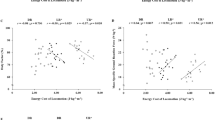Abstract.
The present study was designed to investigate the role of reduced air density on the energetics of 100 m running at altitude. A mathematical supply-demand model was used where supply had two components, aerobic and anaerobic and demand had three components: the cost of overcoming non-aerodynamic forces (Cna), the cost of overcoming air resistance (Caero), and the cost due to changes in the runner's kinetic energy (Ckin). Actual instantaneous-speed curves recorded in 100 m world champions were modelled at sea level. Then I calculated improvements in 100 m running times and changes in the components of the energy cost with changes in altitude from 0 m to 4,000 m. For the 100 m world championship for men, the model predicted times of 9.88 s at sea level, 9.80 s at 1,000 m, 9.73 s at 2,000 m, 9.64 s at 4,000 m and 9.15 s in the hypothetical situation where the air resistance was nil. In the counterpart for women the corresponding times were 10.85 s, 10.76 s, 10.70 s, 10.60 s and 10.04 s. The Caero was 12%–13% of demand at sea level, 10%–11% at 2,000 m and 8%–9% at 4,000 m. When Caero decreased this led to better performance by making more energy available for acceleration. Accordingly, Ckin increased from 20%–24% at sea level to 23%–27% at 4,000 m. There was no effect of altitude specific to body size.
Similar content being viewed by others
Author information
Authors and Affiliations
Additional information
Electronic Publication
Rights and permissions
About this article
Cite this article
Arsac, L.M. Effects of altitude on the energetics of human best performances in 100 m running: a theoretical analysis. Eur J Appl Physiol 87, 78–84 (2002). https://doi.org/10.1007/s00421-002-0587-3
Accepted:
Issue Date:
DOI: https://doi.org/10.1007/s00421-002-0587-3




